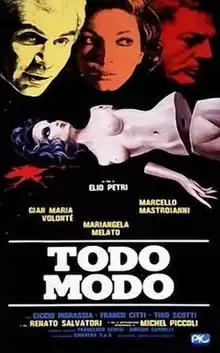| Todo modo | |
|---|---|
 Film poster | |
| Directed by | Elio Petri |
| Screenplay by | Berto Pelosso Elio Petri |
| Based on |
|
| Produced by | Daniele Senatore |
| Starring | Gian Maria Volonté Marcello Mastroianni Mariangela Melato |
| Cinematography | Luigi Kuveiller |
| Edited by | Ruggero Mastroianni |
| Music by | Ennio Morricone |
Production company | Cinevera |
| Distributed by | PIC |
Release dates | |
Running time | 130 minutes |
| Country | Italy |
| Language | Italian |
Todo modo (lit. "By all means"),[lower-alpha 1] also known in English as One Way or Another, is a 1976 Italian satirical[4] political drama film directed by Elio Petri starring Gian Maria Volonté and Marcello Mastroianni.[1][3][5] It is loosely based on the novel of the same name by Leonardo Sciascia.[1]
Plot
During a mysterious epidemic in Italy, numerous political leaders, industrialists, bankers, and business leaders of the ruling party, the Christian Democrats, arrive in a hotel called Zafer. With the party's central figure, president M., in their midst, they have gathered for an annual three-day retreat, inspired by the Spiritual Exercises of Ignatius of Loyola. The retreat acts as an atonement for their past crimes of corruption and unethical practices, and a renewal of the party's structure, leaders, and interests in order to maintain power in the country. The religious exercises are practiced under the guidance of priest Don Gaetano, who dominates all those at the retreat. Over the course of the next three days, one by one the leading figures of the party fall victim to a murder series.
Cast
- Gian Maria Volonté as M.
- Marcello Mastroianni as Don Gaetano
- Mariangela Melato as Giacinta, M.'s wife
- Ciccio Ingrassia as Voltrano
- Franco Citti as M.'s driver
- Tino Scotti as the cook
- Renato Salvatori as Dr. Scalambri, the judge
- Michel Piccoli as He
- Cesare Gelli as Arras, Vice Commissioner
Production
Volonté's character "M." (who was not in Sciascia's book but invented by Petri)[6] was modeled after Aldo Moro, then prime minister of Italy.[5] As Elio Petri noted in his diary, the actor was so absorbed with his role that he took on the movements and intonation of Moro throughout the filming.[5] In the words of Petri biographers Federico Bacci, Nicola Guarneri and Stefano Leone, the film is a portrait of the "deviant" mental structure of the men in power of the Christian Democrats.[7]
Release and reception
Todo modo met with much controversy during its initial release.[6] In his review for L'espresso, Alberto Moravia argued that the film was driven solely by its "hatred against the ruling group currently in power in Italy".[8] Leonardo Sciascia, author of the novel which the film was based upon, defended Petri's adaptation, stating, "Todo modo is a Pasolini film, in the sense that the trial that Pasolini wanted and was unable to bring against the Christian Democratic ruling class is now done by Petri."[6] Two years later, after the Red Brigade's murder of Aldo Moro, the film, depending on the source, either disappeared from circulation[4] or was outright banned.[9]
In 2014, the film was restored by the Cineteca di Bologna and the National Museum of Cinema, Turin,[1][5] and presented at the 71st Venice International Film Festival.[1] It saw a theatrical re-release the following year.[1]
Awards
- Nastro d'argento for Best Supporting Actor Ciccio Ingrassia[1]
Notes
References
- 1 2 3 4 5 6 7 8 "Todo modo". Cinematografo (in Italian). Retrieved 20 December 2023.
- ↑ Liehm, Mira (1984). Passion and Defiance: Italian Film from 1942 to the Present. University of California Press. p. 354. ISBN 9780520057449.
- 1 2 Canby, Vincent (14 December 1979). "Screen: Two Vehicles For Mastroianni at Thalia". The New York Times. Retrieved 20 December 2023.
- 1 2 "Todo Modo. 1976. Directed by Elio Petri". Museum of Modern Art. 2014. Retrieved 20 December 2023.
- 1 2 3 4 Giubilei, Franco (1 September 2014). "Restaurato "Todo Modo", il film che anticipò l'uccisione di Aldo Moro". La Stampa (in Italian). Retrieved 14 March 2018.
- 1 2 3 "Todo modo". Treccani (in Italian). Retrieved 20 December 2023.
- ↑ Petri, Elio; Bacci, Federico; Guarneri, Nicola; Leone, Stefano (2006). Un amore lungo: tre inediti di Elio Petri (in Italian). Feltrinelli Editore. p. 11. ISBN 9788807740213.
- ↑ "Todo modo: antologia critica". Il Cinema ritrovato (in Italian). Retrieved 20 December 2023.
- ↑ Resmini, Mauro (2023). Italian Political Cinema: Figures of the Long '68. University of Minnesota Press. ISBN 9781517911386.
External links
- Todo modo at IMDb
- Moliterno, Gino (March 2013). "Todo modo". Senses of Cinema. No. 66.